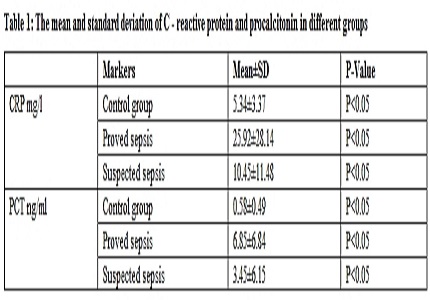Serum procalcitonin: a reliable marker for the diagnosis of sepsis in children
Abstract
Objective: Diagnosis of sepsis in children should be done at the earliest so that appropriate treatment can be started. Though, serum procalcitonin has been studied as an early maker of sepsis still it is not recommended in sepsis guideline because of variable result. In this study, we studied the role of serum procalcitonin in establishing the diagnosis of sepsis in children.
Materials & Methods: Blood samples were collected at admission from 60 children admitted to the central Intensive Care Units at SCB Medical College, Hospital Cuttack from August 2014 to November 2015. Patients were categorized into different groups according to clinical symptoms of sepsis, bacteriological and laboratory data. Group I consisted of 20 children with positive blood cultures and other biological parameters suggesting infection. Group II consisted of 20 children with negative blood cultures but had two or three of clinical symptoms of sepsis. The control group included 20 healthy children with no clinical and biological data suggesting infection. Sreum procalcitonin were determined by immunoluminometric assay method.
Results: Mean levels of procalcitonin in septic children (group I) were significantly higher than the other two groups (P<0.005). Sensitivity, specificity, positive predictive value and negative predictive value were determined for all markers and analyzed and compared with each other.
Conclusion: We concluded that serum procalcitonin was a better marker than C - reactive protein in the diagnosis of sepsis in children.
Downloads
References
2. Young LS. Sepsis syndrome. In: Mandell GL, Bennett JE, Dolin R, editors. Principles and Practice of infectious Disease. Philadelphia: Churchill livingstone; 2005. Pp. 910-920.
3. Remington JS, Klein JO. Bacterial sepsis and meningitis. Infectious disease of the fetus and newnorn infant Philadelphia: W.B. Saunders Company; 2001.
4. Brun-Buisson C. The epidemiology of the systemic inflammatory response. Intensive Care Med. 2000;26 Suppl 1:S64-74. [PubMed]
5. Black S, Kushner I, Samols D. C-reactive Protein. J Biol Chem. 2004 Nov 19;279(47):48487-90. Epub 2004 Aug 26. [PubMed]
6.Chiesa C, Panero A, Rossi N, Stegagno M, De Giusti M, Osborn JF, Pacifico L. Reliability of procalcitonin concentrations for the diagnosis of sepsis in critically ill neonates. Clin Infect Dis. 1998 Mar;26(3):664-72. [PubMed]
7. Vincent JL. Procalcitonin: THE marker of sepsis? Crit Care Med. 2000 Apr;28(4):1226-8. [PubMed]
8. Carrol ED, Thomson AP, Hart CA. Procalcitonin as a marker of sepsis. Int J Antimicrob Agents. 2002 Jul;20(1):1-9. [PubMed]
9. Dellinger RP, Levy MM, Rhodes A, Annane D, Gerlach H, Opal SM, Sevransky JE, Sprung CL, Douglas IS, Jaeschke R, Osborn TM, Nunnally ME, Townsend SR,Reinhart K, Kleinpell RM, Angus DC, Deutschman CS, Machado FR, Rubenfeld GD, Webb SA, Beale RJ, Vincent JL, Moreno R; Surviving Sepsis Campaign Guidelines Committee including the Pediatric Subgroup. Surviving sepsis campaign: international guidelines for management of severe sepsis and septic shock: 2012. Crit Care Med. 2013 Feb;41(2):580-637. doi: 10.1097/CCM.0b013e31827e83af. [PubMed]
10. Mehr S, Doyle LW. Cytokines as markers of bacterial sepsis in newborn infants: a review. Pediatr Infect Dis J. 2000 Sep;19(9):879-87. [PubMed]
11. Kocabaş E, Sarikçioğlu A, Aksaray N, Seydaoğlu G, Seyhun Y, Yaman A. Role of procalcitonin, C-reactive protein, interleukin-6, interleukin-8 and tumor necrosis factor-alpha in the diagnosis of neonatal sepsis. Turk J Pediatr. 2007 Jan-Mar;49(1):7-20. [PubMed]
12. Athhan F, Akagündüz B, Genel F, Bak M, Can D. Procalcitonin: a marker of neonatal sepsis. J Trop Pediatr. 2002 Feb;48(1):10-4. [PubMed]
13. Janota J, Stranák Z, Bĕlohlávková S, Mudra K, Simák J. Postnatal increase of procalcitonin in premature newborns is enhanced by chorioamnionitis and neonatal sepsis. Eur J Clin Invest. 2001 Nov;31(11):978-83. [PubMed]
14. Chan YL, Tseng CP, Tsay PK, Chang SS, Chiu TF, Chen JC. Procalcitonin as a marker of bacterial infection in the emergency department: an observational study. Crit Care. 2004 Feb;8(1):R12-20. Epub 2003 Nov 20. [PubMed]
15. Khoshdel A, Mahmoudzadeh M, Kheiri S, Imani R, Shahabi G, Saedi E, Taheri E, Motamedi R. Sensitivity and specificity of procalcitonin in diagnosis of neonatal sepsis. Iran J Pathol. 2008;3:203-207. [PubMed]
16. Zahedpasha Y, Ahmadpour KacholM, Hajiahmadi M, Haghshenas M. Procalcitonin as a marker of neonatal sepsis. Iran J Pediatr. 2009;19:117-122.

Copyright (c) 2016 Author (s). Published by Siddharth Health Research and Social Welfare Society

This work is licensed under a Creative Commons Attribution 4.0 International License.


 OAI - Open Archives Initiative
OAI - Open Archives Initiative


